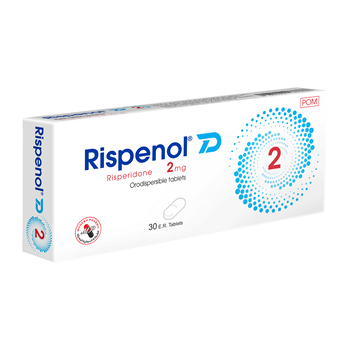Rispenol-D 2
- Risperidone is a selective monoaminergic antagonist with unique properties. It has a high
affinity for serotoninergic 5-HT2 and dopaminergic D2 receptors. Risperidone binds also
to alpha1-adrenergic receptors, and with lower affinity to H1-histaminergic and
alpha 2-adrenergic receptors. Risperidone has no affinity for cholinergic receptors.
Although risperidone is a potent D2 antagonist, which is considered to improve the positive
symptoms of schizophrenia, it causes less depression of motor activity and induction of
catalepsy than classical neuroleptics. Balanced central serotonin and dopamine antagonism
may reduce extrapyramidal side effect liability and extend the therapeutic activity to the
negative and effective symptoms of schizophrenia.
Pharmacokinetic properties:
- Risperidone is completely absorbed after oral administration, reaching peak plasma
concentrations within 1 to 2 hours. The absorption is not affected by food and thus
risperidone can be given with or without meals. Risperidone is metabolized by cytochrome
P-450 IID6 to 9-hydroxy-risperidone which has a similar pharmacological activity as
risperidone. After oral administration to psychotic patients, risperidone is eliminated with
a half-life of about 3 hours. The elimination half-life of 9-hydroxy-risperidone and of the
active antipsychotic fraction is 24 hours. Risperidone is rapidly distributed. The volume of
distribution is 1- 2 L/kg. The plasma protein binding of risperidone is 88%, that of
9-hydroxy-risperidone is 77% one week after administration, 70% of the dose is excreted
in the urine and 14% in the faeces. In urine, risperidone plus 9-hydroxy-risperidone
represent 35 - 45% of the dose. The reminder are inactive metabolites.


